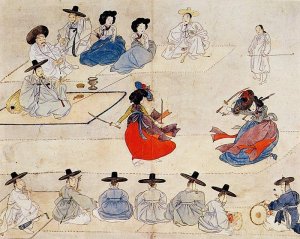An Anti-Romance in the Best Possible Way
The Red Sleeve does something I never thought I’d see in a K-drama - it dares to suggest that love may not conquer all. Most “romantic” sageuks start with the premise that every commoner or court lady dreams of being swept off her feet by a handsome prince, but few look closely at the power dynamics of such relationships, especially in the Joseon era where the patriarchy was so rigid that even the most powerful woman in the kingdom, the Queen Dowager, was essentially under house arrest. To its credit, The Red Sleeve centers this fundamental inequality, suggesting that consenting relationships are impossible if one person is the master and the other, functionally, a slave. It’s also smart enough to feature one of Joseon’s “best” kings as its male lead, emphasizing that the issue is systemic, not individual, and that no ruler, no matter how just, upright and swoony can be an ideal partner as long as they view their love interest as a possession. And when a woman must obey, the line between rape and mutual affection quickly blurs, even if the man is doing it “for her own good.” The discomfort the show induces is magnified by the fact that it includes no easy villains. Everyone has an agenda, but everyone is also trying to do their best in a world where protocol and order take precedence over human feeling. But when human feelings must be excised in the name of duty, the drama reminds us that it’s often women who take the fall. It asks us to reconsider whose lives matter, and argues that agency, even the agency to choose heartbreak, may be preferable to even the dreamiest of suitors.
Esta resenha foi útil para você?

























